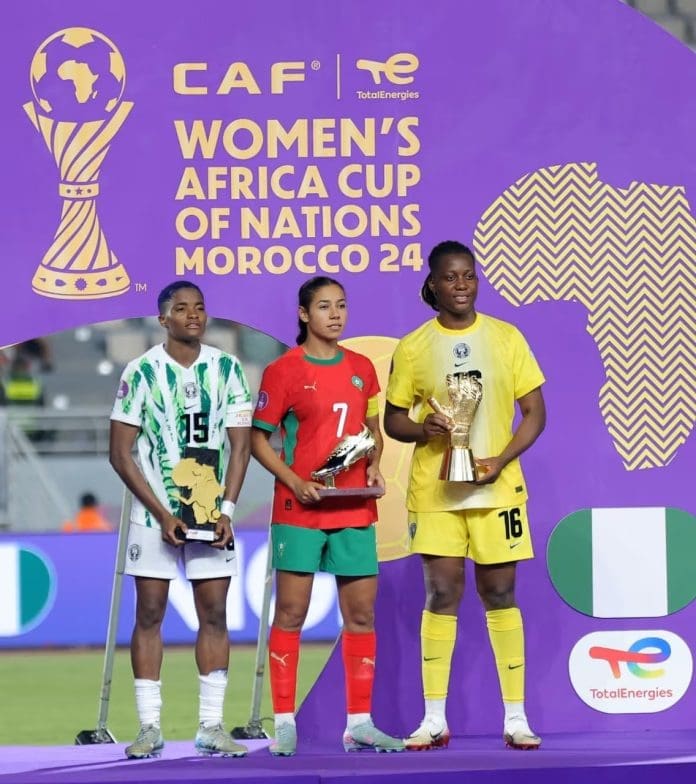The Confederation of African Football (CAF) Executive Committee has approved expansion of the TotalEnergies Women’s Africa Cup of Nations (WAFCON) from 12 to 16 teams, starting with the 2026 edition scheduled for Morocco from March 17 to April 3. The decision, announced Wednesday, November 5, 2025, represents a significant milestone in the development of women’s football across the continent.
Since qualification rounds had already concluded before the expansion decision, CAF approved a selection mechanism based on Federation Internationale de Football Association (FIFA) Women’s World Rankings to determine the four additional participants. The top four teams eliminated in the final qualifying round received invitations to complete the tournament lineup.
Cameroon ranked 66th in FIFA standings, Côte d’Ivoire at 71st, Mali at 79th, and Egypt at 95th will join the competition despite failing to qualify through the traditional pathway. These nations demonstrated sufficient competitive quality during qualification to merit inclusion under the expanded format according to CAF’s assessment criteria.
They join 12 nations that secured qualification through the completed rounds including Morocco as hosts, defending champions Nigeria, South Africa, Zambia, Tanzania, Malawi, Algeria, Ghana, Burkina Faso, Kenya, Cape Verde, and Senegal. The diverse geographic representation spans North, West, East, and Southern Africa, reflecting the continental scope of women’s football development.
CAF described the expansion as aligning with its strategic vision to strengthen competitiveness and advance women’s football throughout Africa. The governing body emphasized that increased participation creates more opportunities for nations to gain exposure at the continental stage while boosting global visibility for African women’s football.
The 2026 tournament serves dual purposes as both the continental championship and Africa’s qualifying competition for the 2027 FIFA Women’s World Cup in Brazil. The top four teams will earn direct berths to the global tournament, while two additional African representatives will compete through intercontinental playoffs for remaining spots.
Morocco becomes the first nation to host WAFCON three consecutive times, having previously staged the 2022 and 2024 editions. The North African kingdom joins South Africa and Nigeria as the only countries to host the tournament three times overall, demonstrating sustained infrastructure investment in women’s football facilities.
The expanded format likely necessitates changes to tournament structure, with speculation centering on four groups of four teams rather than the previous three groups of four with potential for third place qualifiers. This configuration would extend the group phase while creating additional knockout round matchups, increasing total matches played throughout the competition.
Nigeria enter as defending champions after winning the 2024 edition held in July 2025, a tournament delayed by one year from its original 2024 schedule. The Super Falcons have dominated African women’s football historically, winning 11 of the 15 editions played since the competition launched in 1991.
The expansion provides opportunities for nations that have invested in women’s football development but historically struggled to reach the continental finals. Cameroon and Mali in particular have demonstrated growing competitiveness, with Cameroon’s FIFA ranking reflecting significant progress in recent years through sustained investment in grassroots programs and professional league development.
Egypt returns to the continental stage after periods of absence, benefiting from increased governmental support for women’s sports following broader societal shifts regarding women’s participation in athletics. The North African nation’s inclusion alongside Morocco creates potential for regional derbies that could generate significant local interest.
Côte d’Ivoire represents West African football strength outside traditional powerhouses Nigeria and Ghana, reflecting the region’s depth in women’s football talent. The Ivorian federation has prioritized youth development programs that have produced technically skilled players competing in European leagues, raising the national team’s overall quality.
The decision follows broader trends in international football toward tournament expansion, with FIFA having increased the Women’s World Cup from 24 to 32 teams starting with the 2023 edition in Australia and New Zealand. UEFA similarly expanded its Women’s European Championship from 12 to 16 teams in 2017, creating precedents that influenced CAF’s deliberations.
Critics of tournament expansion typically argue that additional teams dilute competitive quality by including nations unprepared for elite level competition. However, proponents counter that participation accelerates development by providing invaluable tournament experience, media exposure, and financial resources through prize money distribution that supports national program growth.
Financial implications remain unclear, as CAF has not announced whether expansion requires increased sponsorship commitments from TotalEnergies or other commercial partners. Additional teams generate more matches requiring stadium availability, referee assignments, and logistical coordination, potentially increasing operational costs that must be offset through revenue sources.
Morocco’s preparation now expands to accommodate four additional teams, requiring evaluation of stadium capacities, training facility availability, and accommodation infrastructure. The country successfully hosted previous editions, demonstrating organizational capabilities, but the larger tournament tests logistical systems at greater scale.
The announcement arrives as African women’s football experiences unprecedented growth in visibility and investment. Several African players compete in top European leagues, while domestic competitions across the continent have attracted corporate sponsorship and broadcast coverage previously unavailable to women’s football.
Source: newsghana.com.gh











